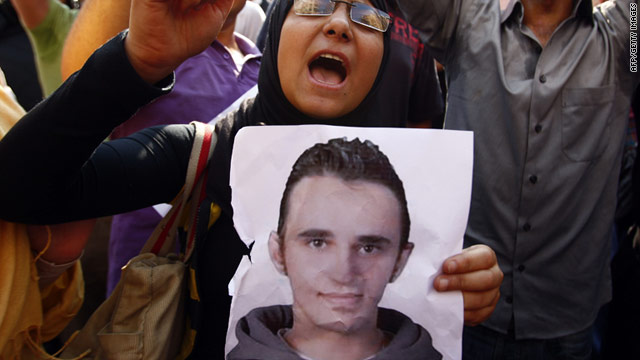Torture and anti-torture are everywhere. Are the revolutions sweeping through the Arab world, and being confronted with violent counter-revolutions, in part a battle over the use of torture? It is, perhaps, too early to know how significant or central torture is to the protest movements that have disposed of the torture-prone regimes in Tunisia and Egypt, and the ongoing battles against authoritarians in Syria, Yemen, Bahrain, not to mention the Palestinian Authority, Saudi Arabia, Libya and beyond. Someday, we may look back on this period as a decisive moment, where either anti-torture broke the dam of authoritarianism by galvanizing mass protests, or torture was the means of reestablishing it.
The best scholarship on torture, like the best scholarship on genocide, war crimes, and crimes against humanity, is grounded in the historical and political context of perpetration and victimization. “Context” in this context is, to a large extent, territorially and/or demographically specific. Torture is a globalized phenomenon in the sense that it continues to be perpetrated in countries all over the globe. But it is not a global phenomenon because the “how’s” and “why’s” in any given context are always specific and distinctive, albeit fertile comparisons can be drawn among torture regimes. Unlike other gross crimes, torture targets individuals in custody.
In the post-9/11 era, torture was more transnationalized in the context of the US “global war on terror” and the CIA’s program of extraordinary rendition as prisoners were moved around the world to be interrogated and detained, often brutally, and in many cases by agents of more than one country. Egypt was a favorite torture destination for the US, and Jordanian torturers were touted by their American counterparts as “the best” in the region, enjoying an ignominious reputation even more vaunted than the Israelis. Pakistan plays a particularly bizarre role, as both the starting point for many of the tortured who were transported elsewhere, and as brutal torturers feeding the pipeline. When the future revolutionaries in Pakistan take control of their government’s security files, we will surely learn a great deal more about the transnational torture regime than we know now. Wikileaks has been an excellent intermediary source of information.
By way of an earlier historic example of transnationalized torture, there was “Operation Condor” in the Southern Cone of Latin America, when military regimes, all with US backing, agreeably breached each other’s sovereignty to kidnap and torture or execute their own “subversive” nationals who had fled their countries to find refuge elsewhere in the region. Back then, the rationale to torture was (as now) the ideology of “national security,” and the goal was victory in the “war on communism.” Back then, communists and leftists were the “terrorists” who enjoyed no rights. In Latin America today, however, torturers of yesteryear quake because they are, in impressive numbers, facing their comeuppance in the courts of law that they once manipulated and eluded. Demands for death to amnesty and justice for the perpetrators are no longer merely utopian aspirations. Real culprits are in real jails—forever. And the bogeyman of communism is now a laugh line.
We Are All Khaled Said: Requiem and Retribution

The brutal murder of Khaled Said by Egyptian police on June 6, 2010, was both a catalytic and a symbolic event for the Egyptian revolution. The facebook page We Are All Khaled Said was a requiem for the dead blogger, and it was instrumental in the events that would follow half a year later. Last week, on the one year anniversary of Khaled’s murder, anti-torture revolutionary activists stenciled Khaled’s image all over Cairo. Egyptian revolutionary and blogger Hossam El-Hamalawy has created a website, Piggipedia, to document a running list of torturers and their post-Mubarak fates—often promotions in the “transitional” government of Egypt. If knowledge is power, as El-Hamalawy contends, then showing these men’s pictures and current postings is a means of enabling the revolution to target them, with insistent demands for accountability. Piggipedia is an effort to give teeth to the political aspiration of nowhere to run, nowhere to hide. Or, as some South Africans once chanted, never forget, never forgive. As long as a torturer is alive, he is a legitimate target of prosecution, if the conditions are right. (Are you listening, still-alive Henry Kissinger and Dick Cheney?)
During the Arab Spring revolutions, there was an incredible outpouring of artistic and creative expressions and journalistic reporting of anti-authoritarianism. In recent weeks, this outpouring has continued, inflected with a dose of strong anti-torture politics. Consider the following examples:
June 7 anti-torture protests throughout Cairo.
A first-person account of torture and survival in Syria.
The persistence of American torture and denial of rights, to which ground zero is Bagram prison in Afghanistan.
The torture-murder of 13-year-old Hamza Ali al-Khateeb reinvigorates anti-regime protests in Syria.
Maziar Bahari, an Iranian journalist, who was subjected to torture by the regime and wrote a book about his family’s multi-regime experience of torture and resistance.
If There Is a Lesson To Be Learned
Debates about whether torture is the worst thing that can happen to a person are fruitless in the sense that there will never be a consensus on whether being tortured and surviving is worse than being tortured to death or being killed by other means. But one thing is very clear, as so lucidly expressed by Jean Amery, a Belgian Jewish resister who was tortured by the Nazis: For those who survive, “Torture is the most horrible event a human being can retain within himself." That sentiment clearly has been one motivation for Arab revolutionaries to bring down their authoritarian regimes. And it is a sentiment that endures in demands for accountability. Some torturers die peacefully in their beds. Some don’t. Making peaceful death impossible is a valid and motivating goal in the continuing revolutionary politics in the Arab world. As an American, it is my motivating goal, too. The transnationalized anti-torture mantra is: Death to immunity and destruction of the political power of those who claim impunity.